#doctor.
Text

ivan….
#craszy ass doctor dont let his beautiful eyelashes fool u he will use u in an experiment#my a.#doctor.
3 notes
·
View notes
Photo


October 4th 1716 saw the birth of Scottish physician James Lind.
In May 1747 Lind began a controlled experiment which demonstrated that citrus fruits could prevent scurvy, the importance of Lind’s findings on scurvy were recognised at the time, bul for some reason was ignored. it was more than 40 years later that an official Admiralty order was issued on the supply of lemon juice to ships. With this, scurvy disappeared almost completely from the Royal Navy.
Born in Edinburgh in to a family of merchants, Lind was educated at the Royal High School. In 1731, aged 15 he registered as an apprentice at the College of Surgeons in Edinburgh and in 1739 became a surgeon’s mate, seeing service around the world in the Royal Navy.
James Lind is remembered as the man who helped to conquer a killer disease. His reported experiment on board a naval ship in 1747 showed that oranges and lemons were a cure for scurvy, he selected 12 men from the ship, all suffering from scurvy, and divided them into six pairs, giving each group different additions to their basic diet. Some were given cider, others seawater, others a mixture of garlic, mustard and horseradish. Another group of two were given spoonful’s of vinegar, and the last two oranges and lemons. Those fed citrus fruits experienced a remarkable recovery. While there was nothing new about his discovery - the benefits of lime juice had been known for centuries - Lind had definitively established the superiority of citrus fruits above all other ‘remedies’.
In 1748, Lind retired from the navy and went to Edinburgh University to take professional qualifications.
In 1753, he published 'A Treatise of the Scurvy’ and in 1757 'An Essay on the Most Effectual Means of Preserving the Health of Seamen in the Royal Navy’, which threw much light on the appalling living conditions and diet of seamen. In 1758, he was appointed physician to the Naval Hospital at Haslar in Gosport where he investigated the distillation of fresh water from salt water for supply to ships. In 1759 he proposed to use solar energy for the distillation of water, it wasn’t until 1810 a new type of cooking stove was introduced for the production of fresh water by distillation possible on a useful scale.
Lind married Isabella Dickie and had two sons, John and James. In 1773 he was living on Princes Street in a brand new house facing Edinburgh Castle, imagine waking up to that view every morning! He couldn’t have been that impressed though, as it looks like he retire to live on the English south coast, he died at Gosport in Hampshire as a Knight Commander of the Order of the Bath, in 1794. He was buried in St Mary's Parish Churchyard in Portchester near Fareham.
27 notes
·
View notes
Text
i keep thinking abt that scene where bill and nardole walk into the tardis at the end of the episode and missys in there and they both freak out bc they think shes there for Nefarious reasons but twelve is just like "oh shes here now dont worry. she cant do anything" and expects them to be OKAY WITH THAT
#everything about that scene makes me insane (complimetary)#twelve letting missy stay in the tardis unsupervised at all.#like i know shes uhh whats it called#whatever it is that she is physically unable to pilot the tardis because the controls r programmed not to respond to her#but like#doctor.#this IS the master. known doer of tricks and even nefarious things#twelve putting that level of trust in missy. Yeah#and then the way twelve treats bill and nardole in regards to missy is a whole other thing i could like. die over#the other scene. the flashback after bills death. where shes telling twelve that missy terrifies her.#and twelve just goes 'i know.' and thats the end of it because like. what else can he say!!!! how can he even BEGIN#to make her understand!!!!!!#and he knwos shes right to be scared of her!!!#all of it everything all the time. all of it all the time makes me CRAZY permanently#rotating s10 around in my brain#simon says
5 notes
·
View notes
Text
and what if I told you nine was less afraid of love than ten. what then.
102K notes
·
View notes
Text
"I don't like old sci-fi shows, the special effects look too cheesy" you are incapable of joy. Go to the dungeon.
72K notes
·
View notes
Text
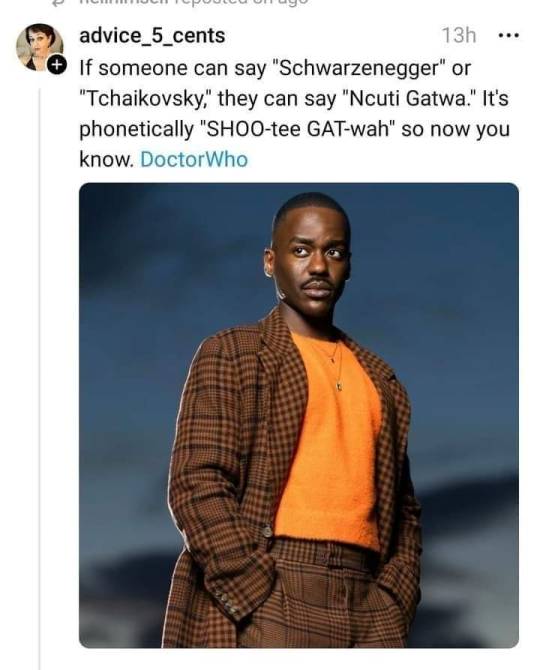
And this is useful to me, I didn't know the "n" was silent. But otherwise his name is very intuitive to say. People don't really have an excuse
54K notes
·
View notes
Text
genuinely, i think watching live theatre can improve your media literacy so much
like people who look at doctor who and are like 'lol the effects are so rubbish'
maybe watch a stage play where there's no backdrops and half the characters are played by the same three guys in different hats and maybe you will calm down
53K notes
·
View notes
Text


#yemen#jerusalem#tel aviv#current events#palestine#free palestine#gaza#free gaza#news on gaza#palestine news#news update#war news#war on gaza#palestinian doctors#genocide#gaza genocide
30K notes
·
View notes
Text
The Doctor and The Master implies a third, less prestigious renegade timelord named The Bachelor
28K notes
·
View notes
Text
Genre of character: submissive like a guard dog is submissive
#very capable of taking care of themselves very eager to take care of someone else#would kill a man for even slightly offending their partner#does what they're told#am i on to anything here?#these people come to mind:#crowley#bucky barnes#izzy hands#the doctor#mostly when it comes to clara oswald#ronan lynch#pearl#from steven universe#romeo#except his person is mercutio not juliet#riza hawkeye
85K notes
·
View notes
Text

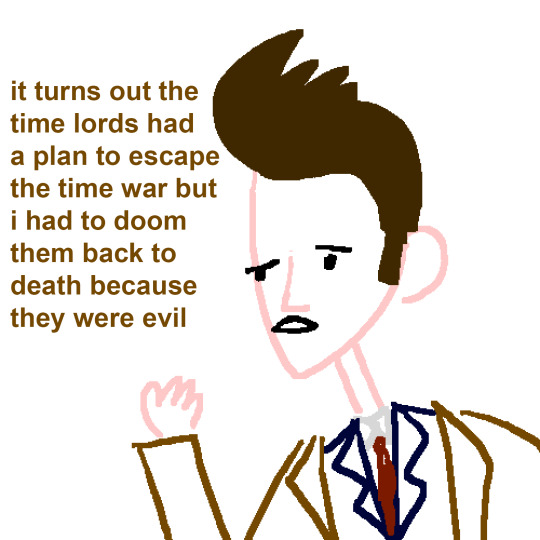


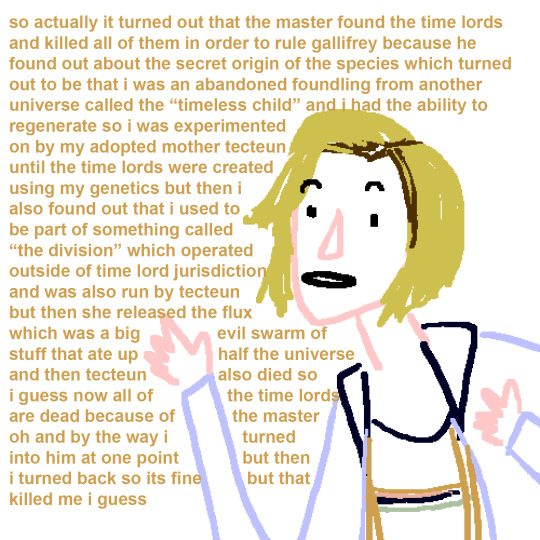
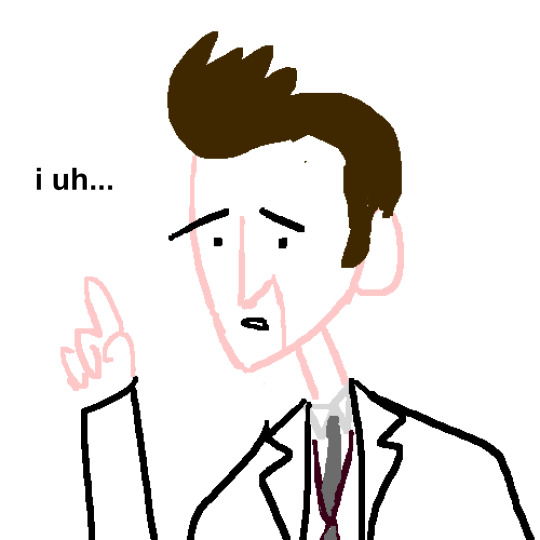

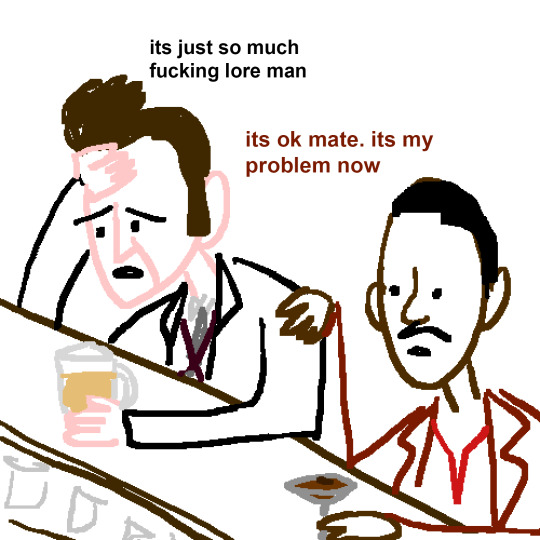
#15 is drinking an espresso martini btw#dw#doctor who#ncuti gatwa#david tennant#christopher eccleston#jodie whittaker#matt smith#peter capaldi#timeless child#so much fucking lore#9th doctor#10th doctor#11th doctor#war doctor#12th doctor#13th doctor#14th doctor#15th doctor#fanart#this was my first time drawing 13 and i really like how i decided to draw her
36K notes
·
View notes
Text
most unfortunate fact ab ivan is that hes half russian
4 notes
·
View notes
Photo

On 13th November 1841 James Braid, the father of hypnotism, attended a demonstration of “mesmerism” that began his interest in the subject.
James Braid was born in 1795 in Kinross-shire. He was educated at the University of Edinburgh and became a member of the Royal College of Surgeons. Braid was a highly regarded surgeon, particularly in the treatment of club foot. However, it is work in hypnosis that James Braid is best known.
Braid moved his surgery practice to Manchester in the 1820s. His interest in hypnosis started in 1841 after attending a performance in Manchester by the Swiss magnetic demonstrator Charles Lafontaine. Braid was convinced that the participants had indeed entered a different ‘state’, though he dismissed the claims it was caused by magnetism and sought a scientific explanation for the trance state he had witnessed,
Braid conducted a number of experiments both on himself and others. He found he could induce trance states with holding an object in front of subjects’ eyes and also through trance. Braid published “Neurypnology or The Rationale of Nervous Sleep Considered in Relation with Animal Magnetism”. Braid was convinced that the trance state he had witnessed and experienced was a type of sleep and therefore named it after the Greek god of sleep, Hypnos.
However, later in the 1840s, Braid realised that many of the features of hypnotism, such as amnesia and anaesthesia could in fact be induced without sleep. Thus, he realised naming the phenomenon after Hypnos was a mistake, though by that point the term hypnosis was widely used to describe the trance state and it was too late to be changed. Braid maintained an active interest in hypnotism until his death in Manchester in 1860.
Hypnotherapy developed into the 20th century with the work of Milton Erickson. Erickson held senior psychiatric posts in hospitals in the USA and was extremely flexible with the use of hypnotherapy with his clients, sometimes direct in the use of suggestions, sometimes indirect. Erickson also used a wide range of jokes, stories and metaphors to communicate with the subconscious mind to tackle problems, which Erickson viewed as a process in which symptoms were a part of. By tackling symptoms, Erickson believed it was possible to change the entire pattern of problems and making them easier to deal with.
You can find out much more about James Braid The James Braid Society web page here on https://www.jamesbraidsociety.com/braid.htm
16 notes
·
View notes
Text
"what does a TARDIS malfunction sound like?"
"idk just dump the entire goofy sound effects library in the span of 10 seconds. That should do it"
35K notes
·
View notes
Text

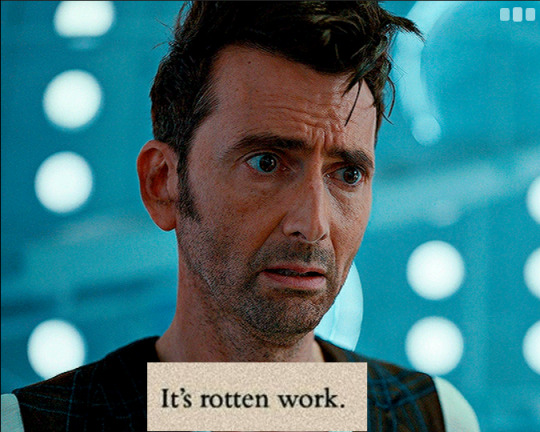

#dw spoilers#doctor who#tennant doctor#fourteenth doctor#donna noble#fucked up that this is just applicable to them now as it was in 2008. I feel so so so much about Them
37K notes
·
View notes
Text


More profound when you consider that Doctors Without Borders rarely makes political statements.
In #UNSC mtg on Middle East, @MSF
SG Christopher Lockyear says: "Israeli forces have attacked our convoys, detained our staff, bulldozed our vehicles, hospitals have been bombed and raided. And now for a second time, one of our staff shelters has been hit. This pattern of attacks is either intentional or indicative of reckless incompetence. Our colleagues in #Gaza are fearful that as I speak to you today, they will be punished tomorrow."
He adds: "The humanitarian response in Gaza today is an illusion. A convenient illusion that perpetuates a narrative that this war is being waged in line with international laws. Calls for humanitarian assistance have echoed across this chamber. Yet in Gaza we have less and less every day, less space, less medicine, less food, less water, less safety."
35K notes
·
View notes